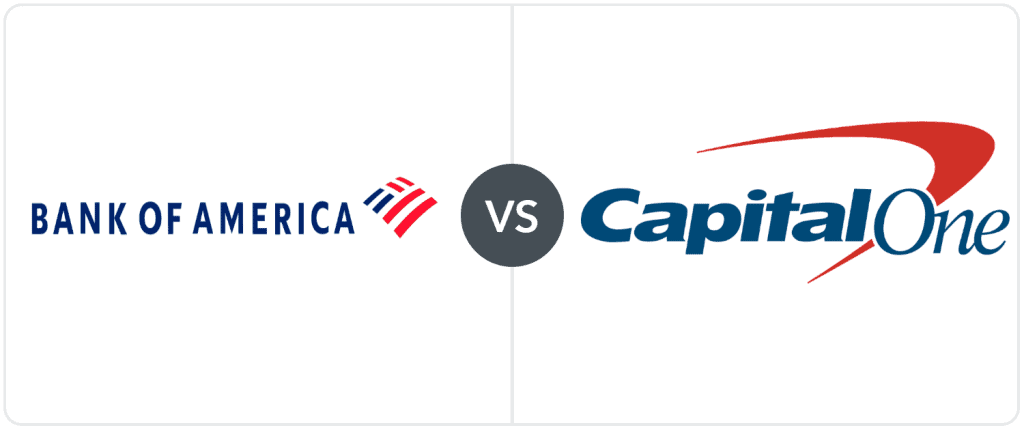Bank of America VS Capital One Business Banking Comparison
Capital One and Bank of America offer similar business banking services. Since they share many of the same features, explore their differences to see which is the right fit for you.

| Bank Of America | Capital One | |
|---|---|---|
| Ideal For | Businesses with low transaction volume and only domestic spending | Businesses with cash-heavy sales |
| Services Offered |
|
|
| Pricing | $0-$29.95/month | $10-$75/month |
| Accounting Integrations | QuickBooks | Xero |
| Standout Features |
|
|
| What’s Missing |
|
|
Both Capital One & Bank of America offer business banking on top of many other business services, but which one is better for opening a business savings or checking account? Let’s dive into this full Bank of America vs Capital One business banking comparison to see whose features, rewards, and fees come out on top.
Table of Contents
- Bank Of America VS Capital One: Business Banking Comparison At A Glance
- Where Bank Of America Shines
- Where Bank Of America Falls Short
- Where Capital One Shines
- Where Capital One Falls Short
- Bank Of America VS Capital One Business Banking Pricing & Fees Compared
- Bank Of America VS Capital One Services & Banking Features Compared
- Which Bank Is Better For Your Business: Capital One Or Bank Of America?
- Capital One VS Bank Of America FAQs
Bank Of America VS Capital One: Business Banking Comparison At A Glance
Let’s start with some important similarities: Capital One and Bank of America both offer FDIC-insured checking and savings accounts and online access. No matter which you choose, your money will be safe. Both Capital One and Bank of America offer unlimited online transactions, as well as widespread ATM access, and you can use each for merchant services, lending, or credit cards in addition to business banking.
The big differences between the two are that:
- Capital One has far fewer physical branches than BoA (although both offer online banking and online applications, so this may not be an issue for most businesses)
- Bank of America has potentially lower monthly cash deposit limits
- Capital One has a high-yield savings account, and Bank of America doesn’t (BoA only has CDs)
- Bank of America’s monthly fees are easier to waive than Capital One’s
While these major differences may start cleaning up which bank is better for you already, there are some more minute differences in features and fees that we’ll dive into so that you can make the best choice possible for your business.
If you like what you’ve seen about either so far, you can learn more by reading our full Capital One business banking review or our full Bank of America business banking review.
Where Bank Of America Shines
If bigger is better, you can’t go wrong choosing Bank of America, the second-largest bank in the US and the eighth-largest in the world. With branches and ATMs around the country, and even in some locations overseas, Bank of America is available wherever you need it to be.
Bank of America offers just about all the services small business owners could want, including the basics like checking and savings plus merchant services, access to credit, payroll services, and professional investment advice from its subsidiary Merrill Lynch.
Here are some highlights for Bank of America:
- Physical branches in all 50 states (as opposed to Capital One’s eight)
- Preferred Rewards for Business program benefits that include bonus rewards, loan discounts, and more
- Strong mobile app
- Monthly fees are easy to waive
- Cash flow monitoring & credit card monitoring features
- Professional advice via Merrill Lynch
- Virtual assistant
- QuickBooks integration
Where Bank Of America Falls Short
While Bank of America has a lot going for it, there are a few areas where this banking option falls short:
- Foreign transaction fees
- Low APY
- Transaction limits
Where Capital One Shines
You may know Capital One for its extensive credit card line (and perhaps its distinctive advertising line), but Capital One operates a direct bank, Capital One 360, that provides business banking services within the Spark line of financial services.
Capital One’s well-rounded business banking program includes merchant services, a high APY on savings (though it’s available only for a promotional period), a free ATM network, and access to credit.
Here are some areas where Capital One’s banking stands out:
- No minimum balance requirements
- Monthly fees can be waived
- Unlimited free online transactions
- Fee-free ATMs
- Access to credit
- Promotional APY on savings
- Xero integration
Where Capital One Falls Short
There are some drawbacks to Capital One’s banking offerings:
- Physical branches only in eight states
- High balance requirements to waive fees on some accounts
- No payroll services add-ons available
Bank Of America VS Capital One Business Banking Pricing & Fees Compared
Capital One and Bank of America are both traditional banks offering standard business banking features, with some added online options and apps. While both have many similar fees, including overdraft protection, there are a few key differences that may help your decision.
Overall, Capital One has higher cash deposit limits and no foreign transaction fees. Unfortunately, Bank of America does have foreign transaction fees, but this bank’s monthly fees are easier to waive than Capital One’s. Unlike other banking mashups, there’s not one clear winner on which bank is cheaper — the better-priced option is really going to depend on what your business values (for example: do you have many foreign transaction fees? Do you deposit a lot of cash?).
As for Capital One, if you choose the Basic checking account, you’ll see a $15 monthly fee that can be waived with a minimum balance of $2,000.
Capital One’s Navigate account has a $35 fee that can be waived with a $25,000 minimum balance, and the Optimize account’s $75 monthly fee can be waived only with an earnings allowance of investable account balances.
Bank of America offers two business checking accounts: Business Advantage Fundamentals, with a monthly fee of either $0 or $16, and Business Advantage Relationship Banking, with a monthly fee of either $0 or $29.95. To waive the monthly fee, you’ll need to maintain an average monthly balance of either $5,000 or $15,000 or join Bank of America’s Preferred Rewards Business program, which requires high average balances.
Both companies waive monthly savings account fees if you open both a savings and checking account together.
Bank Of America VS Capital One Services & Banking Features Compared
Both Bank of America and Capital One offer important banking features like FDIC insurance, accounting integrations, bill pay, fraud protection, and more.
However, on the feature front, Bank of America edges out Capital One with some great finance management tools like cash flow and credit card monitoring.
Although, if you’re looking for a high-yield savings account, you won’t find it with Bank of America. Capital One has a high-yield savings account with an intro APY of 4.10%. If you want a way to earn high rewards with Bank of America, your option is a certificate of deposit (CD). (Capital One also offers CDs if you want an interest-earning option with high rates that last longer than the 6-month promotional APY.)
Here are the specific feature differences between each bank:
Only Bank Of America Offers
- Cash flow monitoring
- Credit card builder
- Zelle integration
- QuickBooks integration
Only Capital One Offers
- High-yield savings with up to 4.10% APY (6-month welcome rate, 1.0% thereafter)
- Xero integration
Which Bank Is Better For Your Business: Capital One Or Bank Of America?
Capital One business banking and Bank of America business banking are both solid options.
If you choose Capital One for your business banking needs, you can access a higher yield on your savings, deposit high amounts of cash without fees, and find reasonable monthly fees that you can waive by meeting minimum balance requirements. However, Capital One’s finance management features are incredibly basic, and if you value in-person banking support, you won’t find it with Capital One.
If you choose Bank of America, you’ll also find reasonable and waivable fees, branch offices near where you work and travel, and a strong mobile app you can use on the go, plus more finance management features and lower balances required to waive fees. However, you will face foreign transaction fees, and you won’t find a high-yield savings account, only a certificate of deposit option.
All in all, Bank of America edges Capital One out in terms of features, but Capital One still has some important draws, including no transaction fees and high savings APY. So, the right business bank account for your business is going to depend on which features your business values the most and how you intend to use your account.
Choose Bank Of America If …
- You value the option of visiting a physical branch in addition to online banking
- You would like $0 monthly fees without having to maintain high minimum balances
- You’d like to take advantage of professional financial advice
- You need payroll services
- You have less than $20K in cash deposits each month
- You use QuickBooks for your business accounting and want a banking system that will integrate easily
- You don’t have many foreign transactions
- You aren’t looking for a high-yield savings account, or you are okay with trading a HYSA for a CD option instead
Choose Capital One If …
- You are comfortable with online banking since there are only eight states where Capital One operates physical branches
- You want to take advantage of a promotional APY on savings
- Your business makes a significant amount of its sales in cash transactions and needs high cash deposit limits
- You want some of the best business credit cards available
- You need no foreign transaction fees
- You use Xero for your business accounting and want to integrate with your banking system
And, if you’ve heard enough about these two banks and wonder what other options you have, we’ve got you covered there, too. Check out our picks for the best business bank accounts.
If you have a significant amount of cash to stash, you may also be interested in our updated list of the best high-yield business savings accounts instead, so you can put your money to work for you.
If you’re still uncertain, thinking about your priorities can help you know what to look for in a business bank account. And once you’ve decided on your top choice of business bank, check out our complete how to open a bank account guide. Happy banking!












